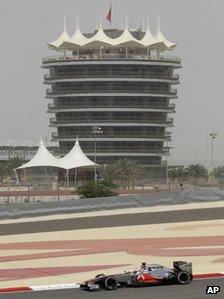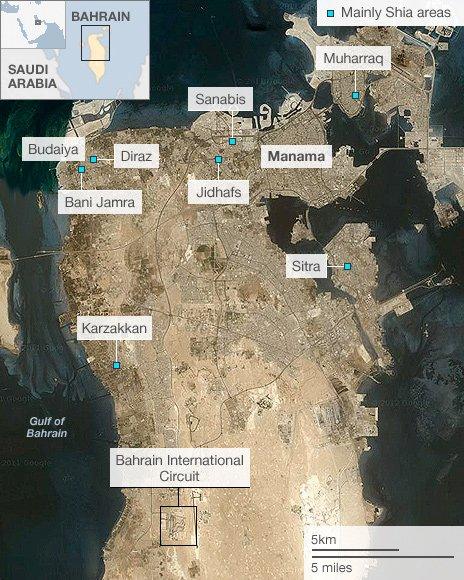Bahrain Grand Prix: Major anti-government protest
- Published
Dan Williams of Human Rights Watch said ''normalcy doesn't exist'' in Bahrain as thousands protested against the Grand Prix
Opposition supporters in Bahrain have attended a mass protest demanding an end to the crackdown on dissent, ahead of the Formula 1 Grand Prix on Sunday.
Tens of thousands people walked along a motorway from Budaiya, an area to the west of the capital, Manama.
Police fired stun grenades and tear gas at a small group who tried to reach the site of the former Pearl Roundabout.
Earlier, Crown Prince Salman bin Hamad Al Khalifa warned that cancelling the Grand Prix "just empowers extremists".
While admitting that Bahrain was "not perfect", he told journalists after Friday's first practice session that the race was a "force for good".
"I think for those of us who are trying to navigate a way out of this political problem, having the race allows us to build bridges across communities, get people working together," he said.
Formula 1 boss Bernie Ecclestone added: "If people have got a complaint about something else, it's nothing to do with F1."
Prince Salman also guaranteed the safety of the racing drivers and teams, after a car carrying members of the Force India team was caught in clashes between police and protesters on Thursday, and a petrol bomb exploded nearby.
Force India's deputy team principal earlier said its involvement in the day's second practice session would be limited, because of safety concerns.
Formula 1's governing body, the FIA, only went ahead with the race after the government said it had security under control.
Hunger strike
As many as 100,000 people are said to have gathered in Budaiya on Friday for the protest organised by the main Shia opposition group, al-Wefaq.
Riot police initially showed restraint, but when a group of about 100 protesters broke away and attempted to reach the site of the former Pearl Roundabout - the focus of last year's pro-democracy demonstrations - they fired stun grenades and tear gas.
A witness told the BBC that a toxic, yellow powdered gas was also fired at the group, which she said was suffocating and paralysing, and that it had caused her to fall over. She said her face was burning.
The main demonstration was sanctioned by the authorities despite overnight clashes between security forces and protesters in several mainly Shia villages.
The overnight demonstrations called for the "overthrow of the regime" and the release of the human rights activist Abdulhadi al-Khawaja, who has been on hunger strike in prison for more than 70 days in protest at the life sentence he received from a military tribunal in June.

One survey says 77% of Bahrainis are in favour of the Grand Prix going ahead
Mr Khawaja stopped drinking water on Thursday and called a lawyer to write his will, according to his daughter, Zainab.
"My father said: "If I die, in the next 24 hrs, I ask the [people] to continue on path of peaceful resistance," she <link> <caption>wrote on Twitter on Friday afternoon</caption> <url href="http://twitter.com/angryarabiya" platform="highweb"/> </link> . "[Second]: he asks that nobody attempts to go on a similar strike til death."
"My father continued: '... I don't want anybody to be hurt in my name,'" Ms Khawaja added.
Bahrain's highest court, the Court of Cassation, is due to rule on Mr Khawaja's appeal against his conviction on Monday - a day after the Grand Prix.
Al-Wefaq reported that 70 people had been injured by security forces in the past two days and 80 others arrested.
"The protests are having international impact because there are foreign journalists here for F1. Once they leave, the repression will continue but the world won't hear about it," activist Nabeel Rajab told the BBC.
The government has called on Bahrainis to move forward and hopes the race will show that life is returning to normal.
It says King Hamad has accepted the findings of an independent panel of human rights experts that investigated last year's unrest, and announced constitutional reforms intended to lead to greater accountability.
